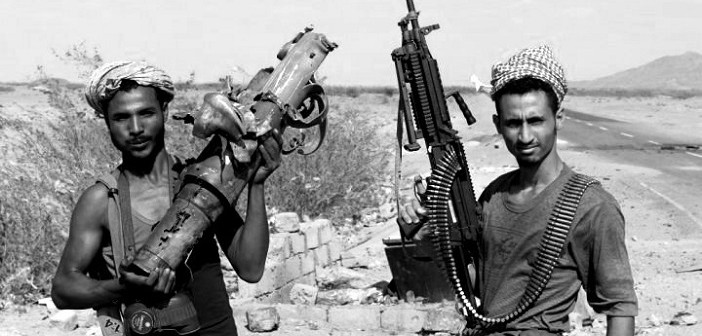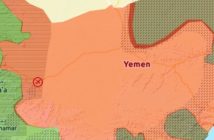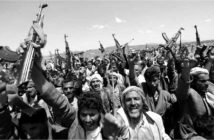One year has passed since the Saudi-led military intervention in Yemen commenced without any signs of an end anytime soon.
The Arab coalition campaign is clearly intending to re-instate the pro-Riyadh Yemeni government and prevent Iran, supporting the Houthi rebellion, from gaining a foothold in Yemen.
Indeed, the Arab military action has foiled the Saleh-Houthi coup d’état and officially re-instated Hadi’s government, despite it still being dysfunctional. Thus, the Iranian potential influence in the southern Arabian Peninsula has been eliminated for the decades ahead.
These truths were recognized clearly once the military operation was launched. Saleh’s absurd adventure has proved a political suicide and caused the Houthi’s bubble to blow up in the face of its makers.
For the Yemeni people, the most important point is to thwart the rebels’ objectives. The spoilers, the Saleh and Houthi alliance, have aimed to disrupt the political transition process, mainly to block the implementation of the outcomes of the National Dialogue Conference (NDC).
Therefore, the military operation will only be judged as a successful one, if it manages to bring the political transitional process back onto the right track. This does not mean to only reinstate the legitimate authority, but also to establish a functional government that can act effectively carry out the outcomes of the National Dialogue Conference.
Since the early days of the Saudi-led intervention, the rebels voiced willingness to sit down for dialogue so as to discuss appropriate peaceful solutions. Saleh announced on the second day of the operation that he would never run for any elections, nor would any of his relatives. He even appealed to the Arab Summit to act for ending the military campaign. The Houthi supporters, Iranian officials and Hassan Nasser Allah, also suggested negotiations to get the crisis solved. Yet Saleh’s suggestions were perceived as only more of his cunning maneuvers to buy time.
Yemen’s history should have taught the incumbent Yemeni leadership that half way solutions were the key reasons behind the most formidable challenges the nation has been struggling with presently.
This is why the Arab military operations have been continuing and must go on, until the ultimate goal is achieved. The rebels would never dare to challenge the national, regional and international community unless they have had a great deal of military and financial capacities. Northern political, tribal and religious elites will never willingly allow any genuine political transformation that may reduce their illegal gains and privileges.
In a revealing interview, the president Abd Rabo Hadi noted that the former president Ali Abdullah Saleh has continued to retain control over 27 military brigades, moreover, when he was still in office in 2011 Saleh ordered 8 brigades in the Sa’ada governorate to take instructions from Abdulmalik Al-Houth. That means, unless the rebels’ military capacities are destroyed, they will never stop creating problems and distracting efforts aiming to implement the outcomes of the NDC, which is the cornerstone of the needed political reforms.
The protracted civil war has caused Yemeni people unspeakable suffering. They can hardly afford any more conflicts. Yet half-way solution will never satisfy their expectations, it is also unlikely to bring about sustainable peace and stability.
Despite the recent unilateral talks in Riyadh between Houthis and Saudi officials, the Saudi Foreign Minister, Adel al-Jubair, confirmed that any political settlement should only be based on the UN Security Council resolutions about the Yemeni crisis.
The US Secretary of State, John Kerry and his French counterpart, Jean-Marc Ayrault, highlighted the importance of a political solution to the conflict in Yemen. During their meeting in Paris on March 13, Kerry andAyrault emphasized that Yemen’s crisis needs to be solved on the basis of the Security Council resolution 2216, GCC initiative and NDC outcomes.
In his interview with the Saudi newspaper “Okadh” in the first week of March 2016, President Hadi demonstrated unflinching resolve to keep on fighting the rebels until the end, he said: “Sana’a would be wrestled automatically once Taiz and Hodeida were recaptured.”
He also appeared to be determined to get the transitional process finished including writing the new constitution and conduction elections. Asked about the government’s priorities after defeating the rebels, he replied: “The drafting of the new constitution shall be put for debate, amendments and public referendum, then presidential and legislative elections need to be held.”
Hadi, whose legitimacy disputed by Saleh and the Houthis, reaffirmed that a Yemeni federal state is imperative said: “Only a Yemeni federal state can be helpful for Yemen… it might be a six or five provinces federal state, however, now a three province federal state is under discussion.”
The idea of a federal state made up of three provinces, that Hadi mentioned, is very important. It may help defuse the opposition to the proposal of a six state federal state, which meets strong opposition of the southerners and the Saleh-Houthi alliance. It is also very useful to reach a political compromise that may save the face of all parties.
Any end game should provide guarantees that all Yemeni political factions are going to work together to put the NDC outcomes into practice. If the Saudi-led military intervention fails to achieve this desirable end, it will be judged an absurd move, such as Saleh’s and the Houthi’s adventure.




